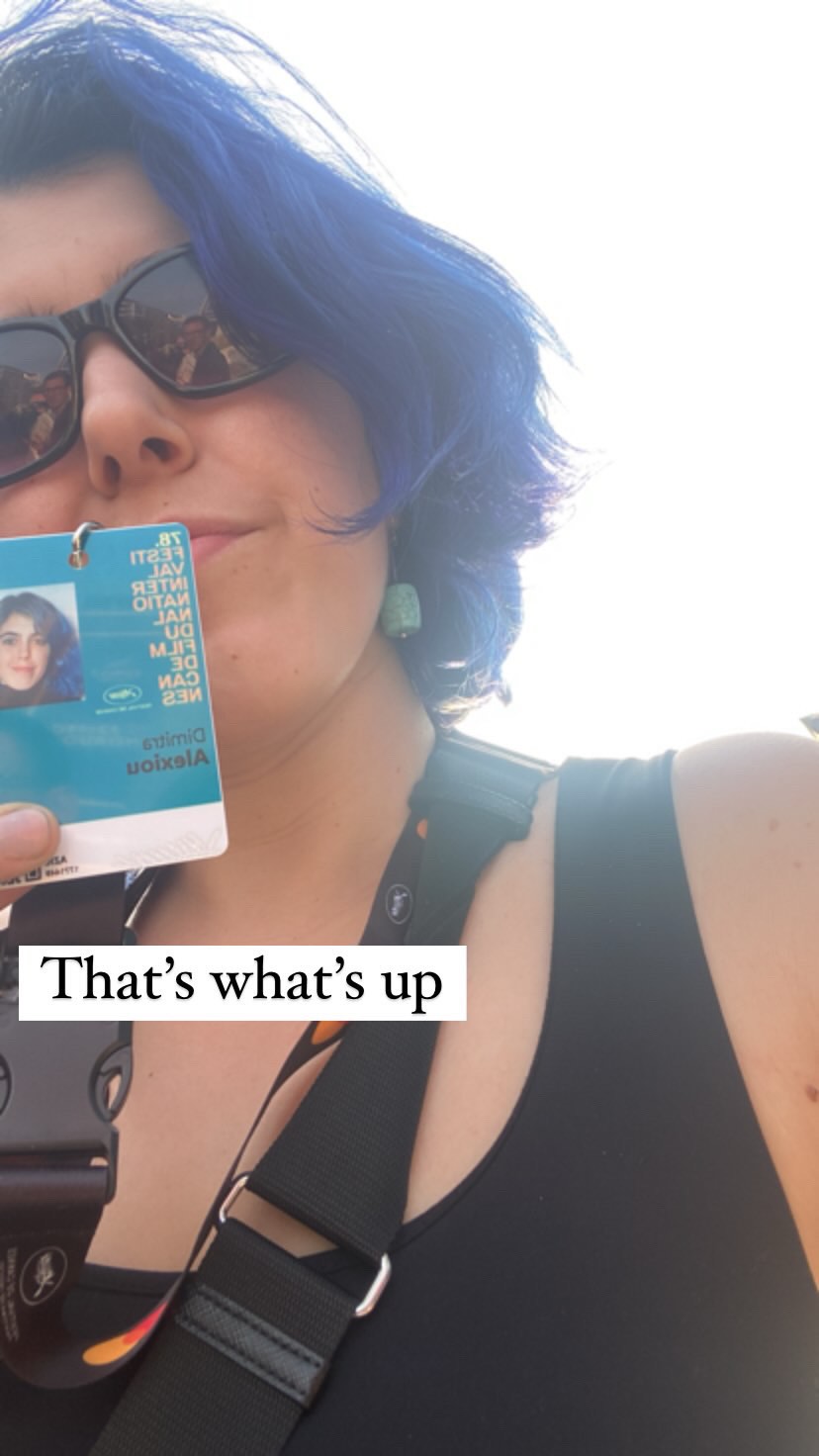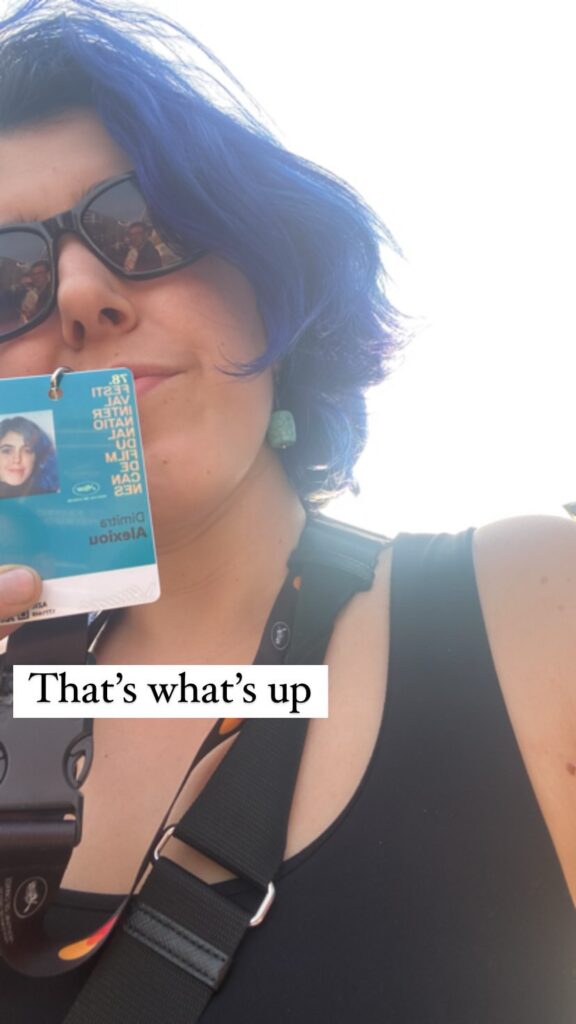
This year was the first time that a long dream of mine came true: I finally visited the Cannes International Film Festival for the first time, let alone as a professional! I was only there for three days, but it was enough to make me love the festival and to start already planning my future visits. I had the accreditation, which allowed me to watch any films I wanted, provided I got tickets in time, however I went there with no tickets and no plan. I got tickets always last minute and always for films I knew nothing about, and despite the fact that I did not see Scarlett Johansson or her film (there’s a place for us), I managed to watch several important films, and especially from the segment ‘Un Certain Regard’. All films, of course, are of a big quality and importance, and everyone should definitely watch them on the big screen.
It has been a long time since then but I was finally able to sit down and write what I remember from the films, followed by my feelings remembering them. Enough with the prologue, let’s start!
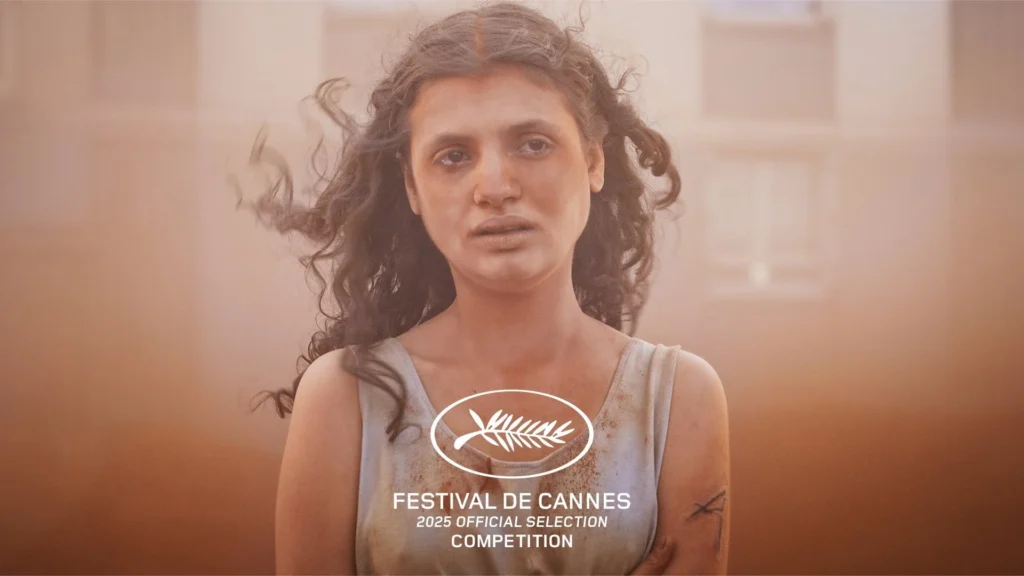
The only film I watched from the Official Competition was Julia Ducournau’s new film, ‘Alpha’. It is a film with many layers, as per usual with Ducournau, that explores most of all the relationship of a teenage girl with her mother who is a nurse during a deadly pandemic.
I was expecting something way more ‘Raw’ from Ducournau (pun intended), but the story, as well as its development, was almost sweet, with minimal harsh images such as physical violence and blood. Instead, the violence was purely psychological and verbal, ranging from talking in a language the protagonist does not understand inside her own home to the insults and isolation she has been dealing with at school. We get to really dive in deep the characters’ realities and fears, however there is a big twist towards the end about what is the reality of the film.
What is done in a splendid way cinematically is the cinematography and colour grading. In the beginning the audience believes that the past is in bright and intense colours, with a palette of red, pink and yellow, and the contrast with the grim reality makes the current events (when Alpha is thirteen years old) in colours such as grey, blue and green, completely bland and ‘washed’. However the big and exciting twist is that the events taking place at the timeline where Alpha is a teenager are not all real, making the colour grading options genius. Alpha spends her time at home with her uncle, an amazing Tahar Rahim, who is a heroin addict and has the exact same reactions and stigma just as her when they suspect she is sick. Moving towards the end of the film we understand that this is not real; it is the trauma she has from the events that went down with her uncle that was triggered by her exclusion in school and fear of her mother.
The end scene is really a spectacular. Mother and daughter come back home together on the same team, in a big alley where a storm covers them, united in their past, present and future. Mélissa Boros and Golshifteh Farahani give stunning performances, that can be considered over the top in the beginning, but prove to be genius when the timeline unravels in the end scene.
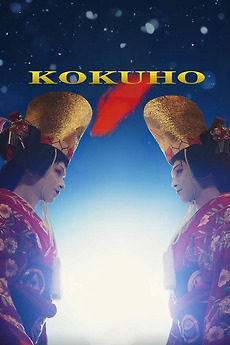
‘Kokuho’ is the first film I watched at the festival. The director was there and he described the film as a ‘melodrama’, and also made a joke about the duration being too long; both declarations were verified, and at the end of the film I felt a small relief from its ending. To be fair, from the premise alone I was not impressed. Melodrama is not really my style, which is only my personal opinion. The film did what it should do, and it did it very well. The acting is impeccable and the fact is I did learn more about the art of ‘Kabuki’, a traditional Japanese form of theatre with its own characteristics, way of performing, language and make-up. The film follows the characteristics of the performances, so it is polished and over the top, but it succeeds in that, it has a clear identity and concise aesthetics.
The story follows a young boy, member of a Yakuza family whose parents were murdered in front of his eyes, as he is taken under the wings of a famous Kabuki actor. The actor has also a biological son, but quickly the young orphan boy becomes family. When he turns out to be more talented than his ‘brother’, the balance in the family and on stage is interrupted, and One thing that stood out to me in a negative way was how the mentor of the two men was behaving, and how nobody in the film, or the film itself, commented on it. Another thing I did not appreciate was the rhythm of the story; I found it unconcise and dragging at times, and while it was probably loyal to the Kabuki style, it was tiring for me.
The film is worth watching if you enjoy Kabuki theatre or maybe have a bigger connection to the Japanese culture; however the duration and the constant heaviness make it too much for me to suggest it to anyone.
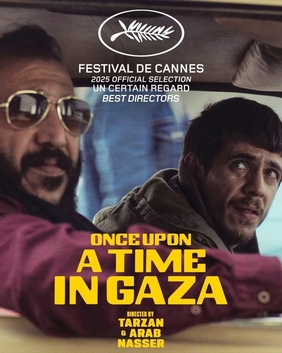
In this turbulent time in history, with the terrible inhumane situations in Gaza, I felt it was my duty to support the film ‘Once upon a time in Gaza’ either I liked it or not. Thankfully, I loved it from beginning to end. The story is about friendship and revenge in Gaza during 2012, while Hamas is in control. The main character Osama is a quiet person, owner of a falafel shop but also secretly drug dealer. He makes deals with a sketchy guy named Abo, who turns out to be a police officer. Their deal goes bad, and Abo ends up ambushing and killing Osama. Years later Osama’s best friend and confident Yahya becomes an actor (quite surprisingly to him as well) and encounters Abo; he has a big decision to make, if he will avenge his friend or not.
The film begins with Trump’s words (such an irony) about Gaza becoming ‘The Riviera of the Middle East’, already warming up the viewer’s emotions. Then we get to meet the protagonists mentioned before. In the beginning of the film we saw that Yayha is involved in the drug dealing but wants to stop, and he announces it to Osama the day of his sudden attack by Abo. It becomes clear that they have a genuine friendship and love each other, which makes Osama’s death even more shocking and painful for the audience. The storytelling of the film is flawless, and the way the events unfold can only draw any viewer in the story even more as time passes.
The scene that brought me to tears was towards the end of the film (minor spoiler ahead) and it was so perfectly placed and connected. While Yahya is on a street trying to escape Oba, there is a very cleverly done flashback that shows us how Osama and Yayha met; Osama awas a taxi driver and Yayha was his client. Their interaction gives us even more insight to their friendship and dynamic.
Another thing I loved about the film was that while the story was unfolding the reality of 2025 was constantly reminded: the headlines of the newspapers, the comments of the protagonists (f*** Israel) and most importantly we were watching scenes of buildings being bombed and destroyed around Gaza every once in a while. It was a painful reminder of the genocide taking place as we speak; the way these scenes were shown was so impactful no one could look away. There is films ad there is reality, and this film combined them in such a way that the images will stay with those who watched it for a long time.
The ending was very emotional; the viewer could feel the unfairness and the sadness for the beloved characters that were brutally murdered one by one. In the end Yayha becomes a hero for the Palestinian people, even though they do not know his personal journey and the actions he had to take for himself. The film is thrilling and very touching, it comes from an honest place, from the hearts of the two brother directors, and is worth for everyone to watch it. I believe it will become a classic, especially regarding the not-so-subtle but masterfully made comments on today’s tragic situation.
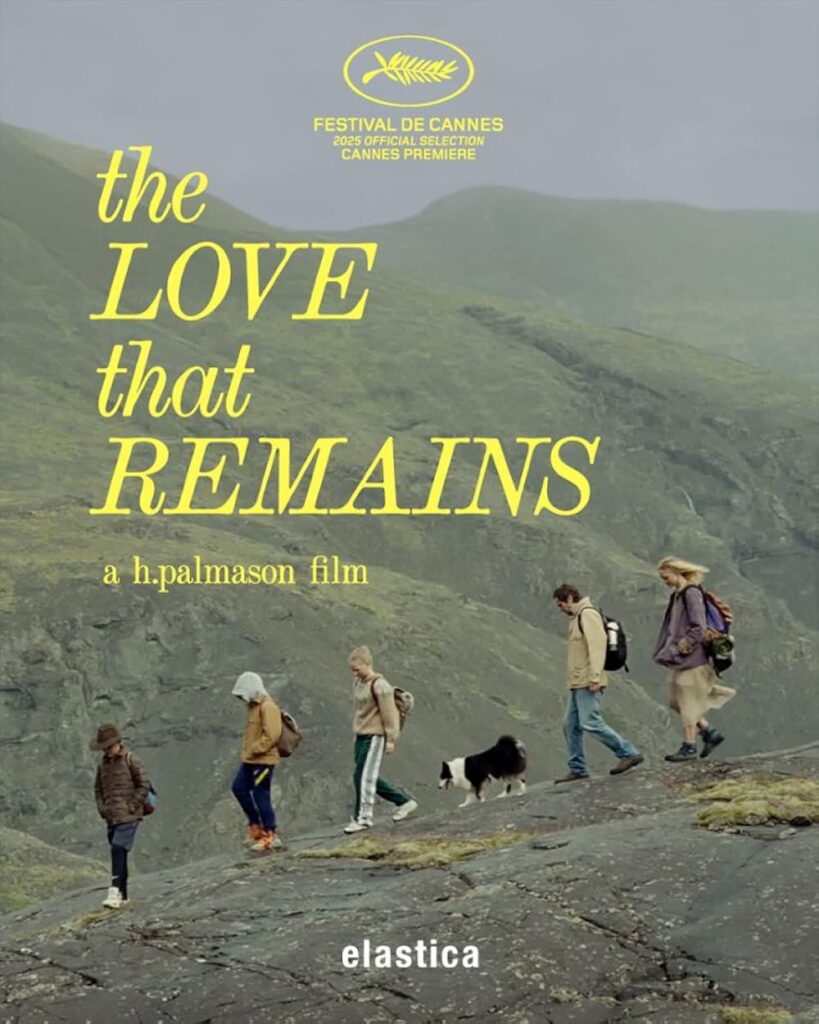
Films from the Scandinavian region are always a different experience; it seems that the aesthetics and way of storytelling is so different than the rest of the world’s that the films will always stick with the external (non-Scandinavian) viewer. The story of ‘The love that remains’ follows Anna and her life as a separated mother and artist. We get to know all the characters in her life very well and we experience together real and surreal experiences, from the everyday life of the contemporary artist in nature to accidents from another era involving bows and arrows.
The surrealistic elements (such as planes falling because of the disappointment of Anna, animals speaking, and much more) are used in a way that creates lightness in important events, making it more digestible for the audience, a practice that works very well. Those scenes are very well blended with the realistic scenes, and are introduced early enough to blend smoothly in the story.
What I missed is a bot more depth in Ana, her life and her mindset. The director tries to portray her as complex and interesting, and she is, but I felt that this was only her surface. She is constantly shown putting her boundaries, enjoying her activities, expressing her frustrations; however there is always a distance between her and the audience.
Nature is another character in the film. It is always present, always dictating the season and the time, looking beautiful but messy. Natural creatures (such as chickens and roosters and horses) are also elements that help us understand the (human) characters better, and their actions with or against them move the plot in a way that makes sense for the audience. Again, however, there is not a lot of depth or explanation given to some actions; for example the father, Ana’s ex, is killing a rooster because the rooster was annoying Ana. That shows the father does not care about nature and only wants what will get him closer to Ana (and that is why he is punished by the Sea in the end, again in a surreal way) but there is no real confrontation between them. We see him arguing with his daughter about it but no real immediate consequences or remorse from his side. This is a perfect way to portray a sort of ‘toxic’ trait in a man, and he does get his punishment at the end, but I still missed more scenes between him and his family that make their relationships clearer.
As I am writing this I realise, there were enough scenes in quantity, but they still lack a certain dynamic. There is always humour there that is very effective, I laughed a lot and there are scenes that tie up the real and surreal in a great way; however the whole plot moves steady and in a line, no fluctuations. Overall worth a watch and I will definitely watch the director’s previous films, as the atmosphere and the lightness wins the audience over, but since he decided to be occupied with such important matters such as family and separation, it would be nice to dive a bit deeper, especially the female characters.
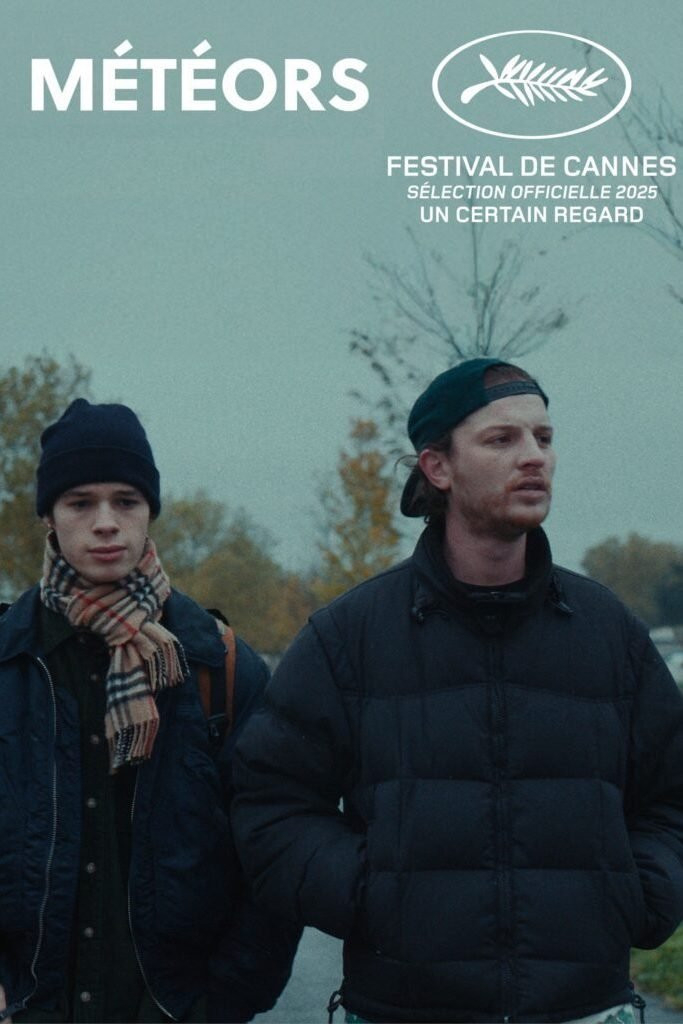
The film ‘Météors‘ brought me to tears many times, which says something on its own. The story focuses on two friends who commit a (rather bizarre) crime and have to face the consequences. While they are in court, one of the two has a seizure that was triggered by his withdrawal, and the story takes an even darked turn. Throughout the film we watch the one friend trying to fix his life according to the law, not drinking, taking up hobbies and ‘babysitting’ his friend who refuses to understand the severity of his actions and the risks he puts himself.
The story is extremely effective, more because it shows how difficult it is to deal with addiction from all sides, whether you are the addict or the addict’s environment. It is painful to watch the people around him not taking his addiction seriously, and only dismissing it as something small, while he is constantly in the risk of dying. The characters are so realistic and are portrayed in a way that will always remind you of someone you know in a situation like this.
It starts of quite surrealistically until the moment of realisation of a real problem, when Daniel has a seizure and his addiction problem is revealed to him and his friend, the protagonist Mickäel. Mickäel is trying to be good after this realisation, picking up new hobbies and going to therapy, as he is being told to, while constantly trying to also protect Daniel, but with no success. He painfully learns that Daniel must accept his own problems, and deal with them. In the middle of the film they turn to Tony for help, getting them a job at the waste management sites he manages, and then is where they are constantly reunited with danger. Daniel is always risking his life, climbing tall buildings and getting in work accidents, while Mickäel fails in balancing his ideals with the life he wants to start living, a ‘normal’ life with normal work and hobbies. What is bizarre is that Tony is always arguing and trying to make Mickäel come around, without realising in what risk he is putting Daniel. He offers Mickäel drinks when he clearly says he wants to stay sober, and always ‘scolds’ him whenever he expresses an opinion that goes against Tony’s interest. Tony believes that he is helping, as many people do in situations like this, in the meantime Daniel’s situation always worsens. The performance by Salif Cissé as Tony is excellent, he truly gives the character the complexity and depth that is needed, and it brings the viewer in a very difficult position (as it should).
When the work accident inevitably occurs, this is when the trio is forever losing the dynamic. Tony just wants to get off the hook and keep his business, and Mickäel is rejecting his offers because of his ideals. Daniel just wants the easy money, and inevitably gets into a fight with Mickäel. The duo separates and we are left to wonder about Daniel’s fate. Mickäel is constantly looking for him, but he does get his life together, doing in the end the things Daniel wanted, but without him. It is a great full circle moment (in the beginning of the film they want to find a fish that was stolen, and in the end Mickäel finds it on his own), and a great metaphor for how his life is going back to normal.
The ending is almost left (Tony is heartbroken when he tells Mickäel that Daniel could be dead, disappearing at a nuclear waste tunnel) open until Daniel sends a letter to Mickäel assuring him he is alright. I don’t know how I felt about that, I feel it is ‘too good to be true’, but then I realised, maybe Tony sent that letter to help Mickäel be relieved form his guilt and responsibilities. This is very smart, and even though it was not as effective as I would like it to, it makes you think and reminisce the film; there are several layers about it that make me still think about the film and the characters, like I am connected to them somehow. This would also mean that Tony’s role is reversed, instead of a sort of ‘villain’ (oversimplification) he finally does something good to help his (firmer) friend go on with his life without guilt. It is overall a sensitive film, a true and unique piece that explains addiction and its impact on others in a way you feel it in your stomach.
Technically speaking the film is excellent, great aesthetics, a bit of dreamy vibes and supportive music. Also the original songs are very well thought of, fixing the scenes every time and making the audience live the scenes with the characters.
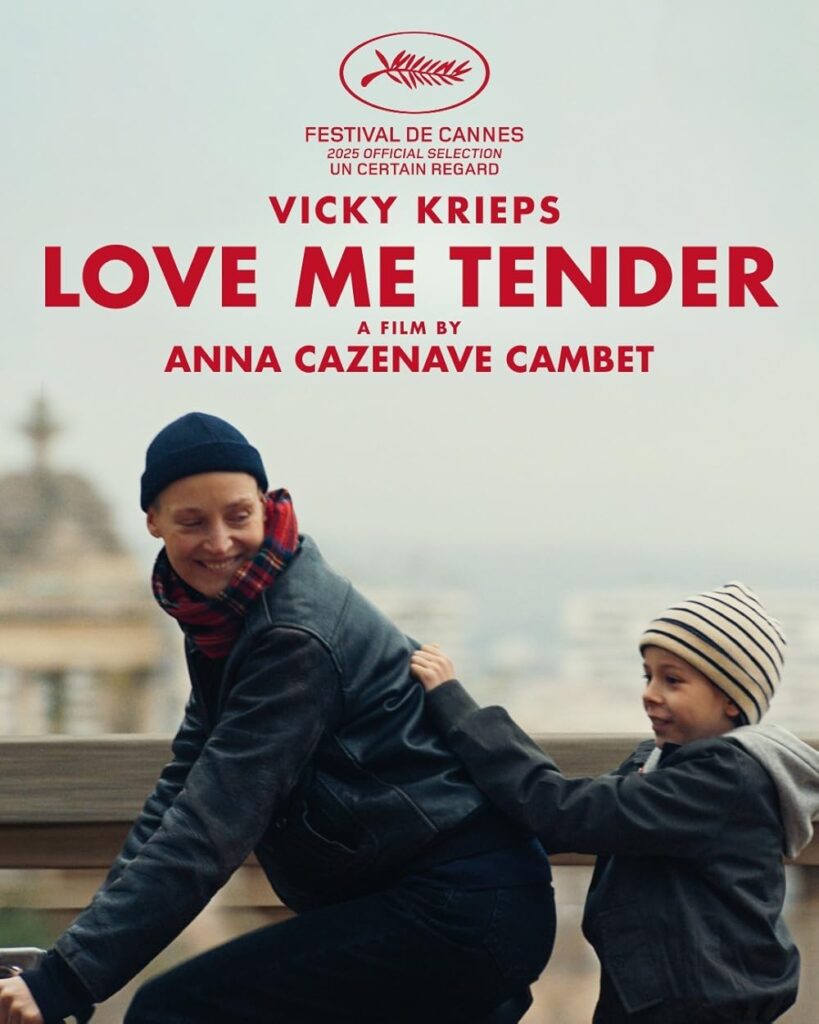
This film had me the most conflicted is called ‘Love me Tender’. I really liked the story itself: a woman, first woman and then mother, is accused by her ex-husband of being unsuited to take care of her own child because of her ‘shift’ in sexuality, meaning she is now having relationships with women.
The story will touch even the most uninterested viewer; however I felt the film became redundant at one point, with the most ‘faulty’ being the fact that there were more than one scenes where you could feel it was ending. In a way maybe it was intentional, as we feel the time pass as slowly as what’s her name feels it without having seen her son for so long.
Talking about film language, I really did not like the way the music was used (while musically it was very pleasant) and I could not connect with the main character at all. I guess this was also on purpose; women do not have to be pleasant or relatable to be themselves and good mothers, and I like that this was portrayed, however with no connection with her, no understanding of her actions (outside motherhood) and the slow and confusing rhythm, it is not easy for me to like and suggest this film for anyone to watch.
Style-wise it was consistent, in a way ‘the most French’ film in the competition, showing a Paris and a French life the way anyone would expect (picturesque cafés, French music, glasses of wine in their hands) and that was effective for the space and to highlight the reality of the theme, but nothing original cinematically.

Finally, the film ‘Lucky Lu’ tells the story of a Chinese immigrant looking for a better life in America, and it only takes place in one day, the day Lu is expecting his wife nd daughter to America so they can all enjoy the life he has been building. However things are not as good as Lu has his family believe. Through a series of unfortunate events, Lu ends up with no home and no job, and nothing he can do about it, as his past ghosts (for which we learn about in a very subtle way) and his life’s choices catch up with him. When his family arrives, his daughter wants to join him at work, as he has not told them the truth about his current problems, and he reluctantly agrees. So half of the film we watch him trying to cope with reality without letting his five-year-old daughter understand the reality.
The aesthetics of the film are unique, with a pallet of blue and grey sticking with the viewer, as Lu travels around New York City day and night. The noise and voices of the city are always there with us and him. The cinematography and sound design are absolutely amazing and they help immerse the audience into the film so easily and fast.
I loved how every aspect of the film, every action that happened was very natural, nothing felt forced or irrational, they all contribute to Lu’s (un)luckiness. The last event that takes place (Lu is run over and abandoned) seems to be the final push for him to give up, but the generosity of one delivery man (even though Lu had stolen his bike before) gives that glimpse of hope the audience yarns for. The ending is open, we only got to experience a day in his life, and are left to wonder how he will proceed with his decision. This decision to leave the ending open contributes only positively to the audience’s feeling of connection with Lu. We end up wondering what we would have done in his position, how we would handle the situations and how we could protect our family. His humane connections with his family, his (former) friends and his struggles become ours as well for the duration of the film; it is magical and bittersweet.
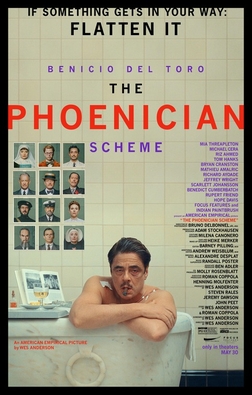
A bit of ‘cheating’ as is, but I did delay the review because I got to watch ‘A Phoenician Scheme’ in Amsterdam, a few days after the film’s Cannes’ premiere. I am a big Wes Anderson fan but I was also a bit disappointed by ‘Asteroid City’, so I went in for a quiet evening of no expectations.
The film surprised me in a great way: it had a lot of layers, a lot of focus in paintings and amazing music. Not that the other Wes Anderson films don’t, but after a series of ‘the same’ this felt different, deeper and darker. The themes of family and travelling are there and executed very nicely, with my only note being that there was too much plot, too many characters and not enough time and space for them all to evolve (I mean, when you have Scarlett Johansson, you take advantage of her, not just give her two lines with a bad accent and then proceed).
Even though it was an improvement from ‘Asteroid City’ and I can definitely see the shift Anderson is taking with his films without sacrificing his well-known style, I still needed more depth and less characters. There is definitely a lot to be said, but I think his earlier films could keep that balance between the character being vulnerable but distant, while more and more his new films ‘fall into a trap’ of style (famous names) over substance (realistic, relatable characters). I would love to connect to the daughter more, and to the father, and to be honest, feel for their cause, which I did not. The great surprise, though, was Cumberbatch’s character, a caricature that served his purpose, being a cartoonish villain and offering some new interest for the actor himself in a film like this.
I had a great time watching this film, I felt very good leaving the cinema, and I will definitely continue following the director’s work, as it is an influential and important one. I also need to say one more time what a great job Alexandre Desplat does; his music always speaks to me, always serves its purpose to the fullest and elevate the experience of watching a film. His musical influences are clear and recognisable, but that does in no way take away from the experience of listening to the music and experiencing the film as a whole. What a great composer to look up to.
This lengthy ‘review’ is just my thoughts after the festival, the films I watched and my impressions; having watched the films only once and in such an intense setting I am sure I have missed some points, but I have to admit the quality and importance of the films are very high. It is really important to watch and understand each film in the way the makers intended, but also the personal details that touch each audience member separately, that is out of the maker’s hand once the film reaches its audience. I am looking forward to going again next year, with more days (and maybe a day with no films) and a more structured schedule. I hope you read until the end and you enjoyed, and most importantly that you are now more eager to watch some films and discuss about them!
